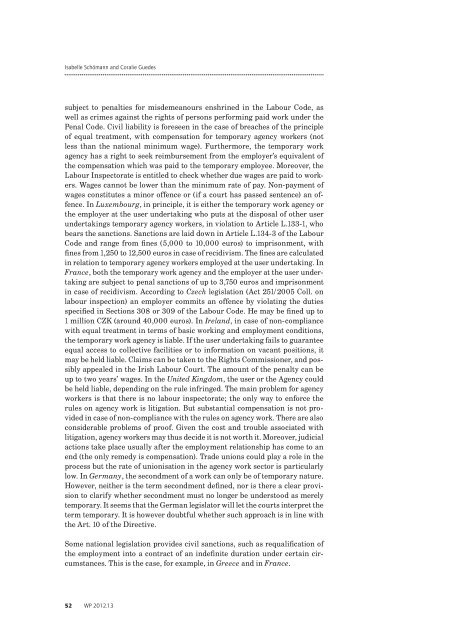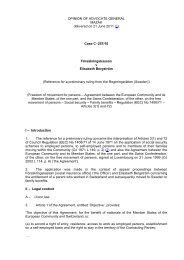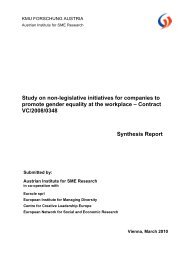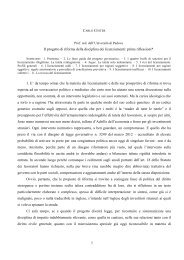Full text - European Trade Union Institute (ETUI)
Full text - European Trade Union Institute (ETUI)
Full text - European Trade Union Institute (ETUI)
You also want an ePaper? Increase the reach of your titles
YUMPU automatically turns print PDFs into web optimized ePapers that Google loves.
Isabelle Schömann and Coralie Guedes<br />
subject to penalties for misdemeanours enshrined in the Labour Code, as<br />
well as crimes against the rights of persons performing paid work under the<br />
Penal Code. Civil liability is foreseen in the case of breaches of the principle<br />
of equal treatment, with compensation for temporary agency workers (not<br />
less than the national minimum wage). Furthermore, the temporary work<br />
agency has a right to seek reimbursement from the employer’s equivalent of<br />
the compensation which was paid to the temporary employee. Moreover, the<br />
Labour Inspectorate is entitled to check whether due wages are paid to workers.<br />
Wages cannot be lower than the minimum rate of pay. Non-payment of<br />
wages constitutes a minor offence or (if a court has passed sentence) an offence.<br />
In Luxembourg, in principle, it is either the temporary work agency or<br />
the employer at the user undertaking who puts at the disposal of other user<br />
undertakings temporary agency workers, in violation to Article L.133-1, who<br />
bears the sanctions. Sanctions are laid down in Article L.134-3 of the Labour<br />
Code and range from fines (5,000 to 10,000 euros) to imprisonment, with<br />
fines from 1,250 to 12,500 euros in case of recidivism. The fines are calculated<br />
in relation to temporary agency workers employed at the user undertaking. In<br />
France, both the temporary work agency and the employer at the user undertaking<br />
are subject to penal sanctions of up to 3,750 euros and imprisonment<br />
in case of recidivism. According to Czech legislation (Act 251/2005 Coll. on<br />
labour inspection) an employer commits an offence by violating the duties<br />
specified in Sections 308 or 309 of the Labour Code. He may be fined up to<br />
1 million CZK (around 40,000 euros). In Ireland, in case of non-compliance<br />
with equal treatment in terms of basic working and employment conditions,<br />
the temporary work agency is liable. If the user undertaking fails to guarantee<br />
equal access to collective facilities or to information on vacant positions, it<br />
may be held liable. Claims can be taken to the Rights Commissioner, and possibly<br />
appealed in the Irish Labour Court. The amount of the penalty can be<br />
up to two years’ wages. In the United Kingdom, the user or the Agency could<br />
be held liable, depending on the rule infringed. The main problem for agency<br />
workers is that there is no labour inspectorate; the only way to enforce the<br />
rules on agency work is litigation. But substantial compensation is not provided<br />
in case of non-compliance with the rules on agency work. There are also<br />
considerable problems of proof. Given the cost and trouble associated with<br />
litigation, agency workers may thus decide it is not worth it. Moreover, judicial<br />
actions take place usually after the employment relationship has come to an<br />
end (the only remedy is compensation). <strong>Trade</strong> unions could play a role in the<br />
process but the rate of unionisation in the agency work sector is particularly<br />
low. In Germany, the secondment of a work can only be of temporary nature.<br />
However, neither is the term secondment defined, nor is there a clear provision<br />
to clarify whether secondment must no longer be understood as merely<br />
temporary. It seems that the German legislator will let the courts interpret the<br />
term temporary. It is however doubtful whether such approach is in line with<br />
the Art. 10 of the Directive.<br />
Some national legislation provides civil sanctions, such as requalification of<br />
the employment into a contract of an indefinite duration under certain circumstances.<br />
This is the case, for example, in Greece and in France.<br />
52 WP 2012.13
















